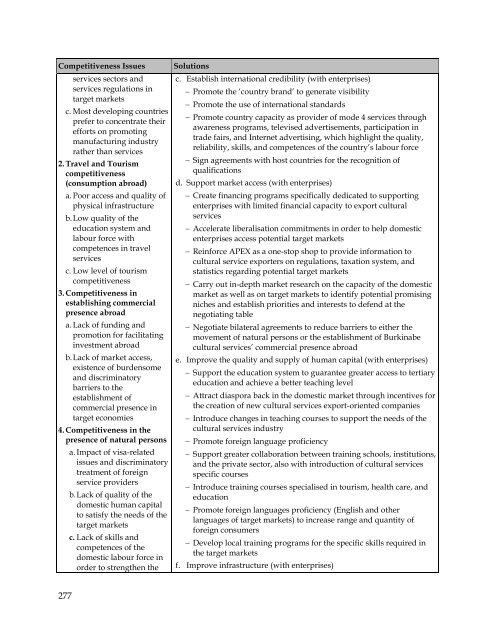CASE STUDIES FROM AFRICA
30769-doc-services_exports_for_growth_and_development_africa
30769-doc-services_exports_for_growth_and_development_africa
You also want an ePaper? Increase the reach of your titles
YUMPU automatically turns print PDFs into web optimized ePapers that Google loves.
Competitiveness Issues<br />
services sectors and<br />
services regulations in<br />
target markets<br />
c. Most developing countries<br />
prefer to concentrate their<br />
efforts on promoting<br />
manufacturing industry<br />
rather than services<br />
2. Travel and Tourism<br />
competitiveness<br />
(consumption abroad)<br />
a. Poor access and quality of<br />
physical infrastructure<br />
b. Low quality of the<br />
education system and<br />
labour force with<br />
competences in travel<br />
services<br />
c. Low level of tourism<br />
competitiveness<br />
3. Competitiveness in<br />
establishing commercial<br />
presence abroad<br />
a. Lack of funding and<br />
promotion for facilitating<br />
investment abroad<br />
b. Lack of market access,<br />
existence of burdensome<br />
and discriminatory<br />
barriers to the<br />
establishment of<br />
commercial presence in<br />
target economies<br />
4. Competitiveness in the<br />
presence of natural persons<br />
a. Impact of visa-related<br />
issues and discriminatory<br />
treatment of foreign<br />
service providers<br />
b. Lack of quality of the<br />
domestic human capital<br />
to satisfy the needs of the<br />
target markets<br />
c. Lack of skills and<br />
competences of the<br />
domestic labour force in<br />
order to strengthen the<br />
Solutions<br />
c. Establish international credibility (with enterprises)<br />
Promote the ‘country brand’ to generate visibility<br />
Promote the use of international standards<br />
Promote country capacity as provider of mode 4 services through<br />
awareness programs, televised advertisements, participation in<br />
trade fairs, and Internet advertising, which highlight the quality,<br />
reliability, skills, and competences of the country’s labour force<br />
Sign agreements with host countries for the recognition of<br />
qualifications<br />
d. Support market access (with enterprises)<br />
Create financing programs specifically dedicated to supporting<br />
enterprises with limited financial capacity to export cultural<br />
services<br />
Accelerate liberalisation commitments in order to help domestic<br />
enterprises access potential target markets<br />
Reinforce APEX as a one-stop shop to provide information to<br />
cultural service exporters on regulations, taxation system, and<br />
statistics regarding potential target markets<br />
Carry out in-depth market research on the capacity of the domestic<br />
market as well as on target markets to identify potential promising<br />
niches and establish priorities and interests to defend at the<br />
negotiating table<br />
Negotiate bilateral agreements to reduce barriers to either the<br />
movement of natural persons or the establishment of Burkinabe<br />
cultural services’ commercial presence abroad<br />
e. Improve the quality and supply of human capital (with enterprises)<br />
Support the education system to guarantee greater access to tertiary<br />
education and achieve a better teaching level<br />
Attract diaspora back in the domestic market through incentives for<br />
the creation of new cultural services export-oriented companies<br />
Introduce changes in teaching courses to support the needs of the<br />
cultural services industry<br />
Promote foreign language proficiency<br />
Support greater collaboration between training schools, institutions,<br />
and the private sector, also with introduction of cultural services<br />
specific courses<br />
Introduce training courses specialised in tourism, health care, and<br />
education<br />
Promote foreign languages proficiency (English and other<br />
languages of target markets) to increase range and quantity of<br />
foreign consumers<br />
Develop local training programs for the specific skills required in<br />
the target markets<br />
f. Improve infrastructure (with enterprises)<br />
277




